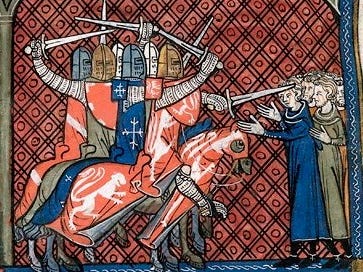History: This morning I see that Alice Evans has seen one too many goodthink and goodfeel museum exhibitions about mediæval European female agency, subversion, and empowerment. And so she has lost it:
Alice Evans: Why Are We Sugarcoating Medieval Misogyny?": ‘History books, museum exhibitions and viral podcasts overflow with tales of female influence <bl.uk/whats-on/medieval…>, resistance <amazon.co.uk/Poet-Mysti…>, and agency <bl.uk/whats-on/medieval…>, while economists triumphantly uncover evidence of women's wealth and wages. Together, these narratives paint medieval Europe as surprisingly progressive. Except this rosy picture conceals a darker truth. In reality, men monopolised ruling prestigious institutions and backed up their bros. Dissidents were shunned, ostracised, or burned alive. Only by confronting medieval Europe’s patriarchal oppression can we diagnose what it took to achieve contemporary equality…. Overturning centuries of male bias, feminist historians tend to highlight women’s agency, subversion and importance. The British Library's current exhibition proudly declares that “medieval women’s voices evoke a world in which they lived active and varied lives. Their testimonies reveal... female impact and influence <bl.uk/whats-on/medieval…> across private, public and spiritual realms”. Browse the exhibition's bookshop and behold dozens of books celebrating subversive women. Wow. What a wonderful matriarchy! But was this representative?… The British Library’s celebration of female ‘influence’ is delightfully heart-warming, their collection of artefacts is truly impressive, but closer examination reveals a fundamental contradiction: how could women exercise meaningful influence if subversives were systematically silenced, suppressed, and or even butchered? In truth, Europe was hugely bigoted. Zealous patriarchs dominated institutional power and ideological persuasion. Getting the facts straight helps us fine-tune our analysis of what actually turbo-charged contemporary equality: the revolutionary forces of industrialisation and secularism enabled women writers to rewrite the script… <
I confess I do not understand why patriarchy has been so strong in human history. Yes, the plough. Yes, with mediæval infant and child mortality socio-cultural patterns that did not induce the typical woman to undergo eight-to-ten pregnancies did not reproduce themselves, and so were replaced by those that did. Yes, nursing (and to a lesser degree pregnancy) limit what you (or some other woman) can effectively and actually want to do outside of the immediate surroundings of the household, and creates a very strong complementarity with actions that have stable state that can be left alone for a while—gardening, textiles, slow cooking. Yes, it is a society of domination in which most men are slaves or serfs, and that expectation of hierarchy leaks across and into gender. Yes, coërcive violence as a constant background threat in a society of domination. But why was all that so ably backed up for so long and so completely by patriarchal ideological fraud?
I need to run some simulations to figure out how large a share of mediæval adult women were without a sub-ten year old hanging on their skirts at any point in time, and think about that…


